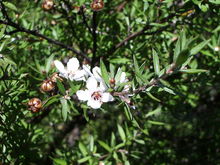As any horse owner knows, horses get their share of cuts and scrapes. If you’re inclined to reach for something natural, consider honey. Honey has been used for centuries because of its antimicrobial properties. In raw honey, the enzymes are still active and work well as a topical first aid. Because of its high sugar content and low pH, honey kills microbes by making the environment more acidic, while also drawing water out of cells.

Manuka (Leptospermum scoparium) flowers
Manuka honey helps alleviate seasonal allergies and speed healing.
Image source: http://en.wikipedia.org/wiki/Image:Manukaflowers.jpg
Manuka honey is especially effective. Collected from the Tea Tree manuka bush native to New Zealand, manuka honey has a higher enzymatic activity, making it more potent than other forms. When eaten, it helps alleviate seasonal allergies that affect the skin and respiratory system. When applied to a wound, it has been shown to speed healing: When researchers at the University of Sydney’s Veterinary Science and Clinical Training Unit compared healing time of open leg wounds over a 12-day treatment period, they found a significant improvement in the honey-treated group in reduction in healing time, size of wound, and amount of proud flesh produced.
Manuka honey can be applied in its natural state, but it is messy and attracts flies; therefore, it requires bandaging. Commercial dealers offer a medicinal gel form that also promotes healing while being easier to apply. Consider including it in your horse’s medicine kit.
Dr. Juliet Getty has taught and consulted on equine nutrition for more than 20 years. The Getty Equine Nutrition website offers a library of helpful articles and previous teleseminars as well as a nutrition forum. Subscribe on the website to her free and informative monthly e-newsletter, “Forage for Thought.” Dr. Getty’s comprehensive nutrition resource, Feed Your Horse Like a Horse, is available for purchase through her website or at Amazon.com. Dr. Getty serves as a distinguished advisor to the Equine Sciences Academy and her articles on equine nutrition are internationally published. She is available for individual consultations. Contact Dr. Getty directly at gettyequinenutrition@gmail.com or (740) 663-2333 (Eastern time zone).
